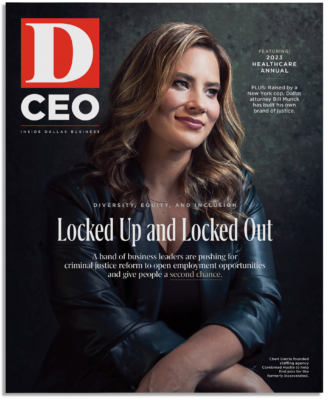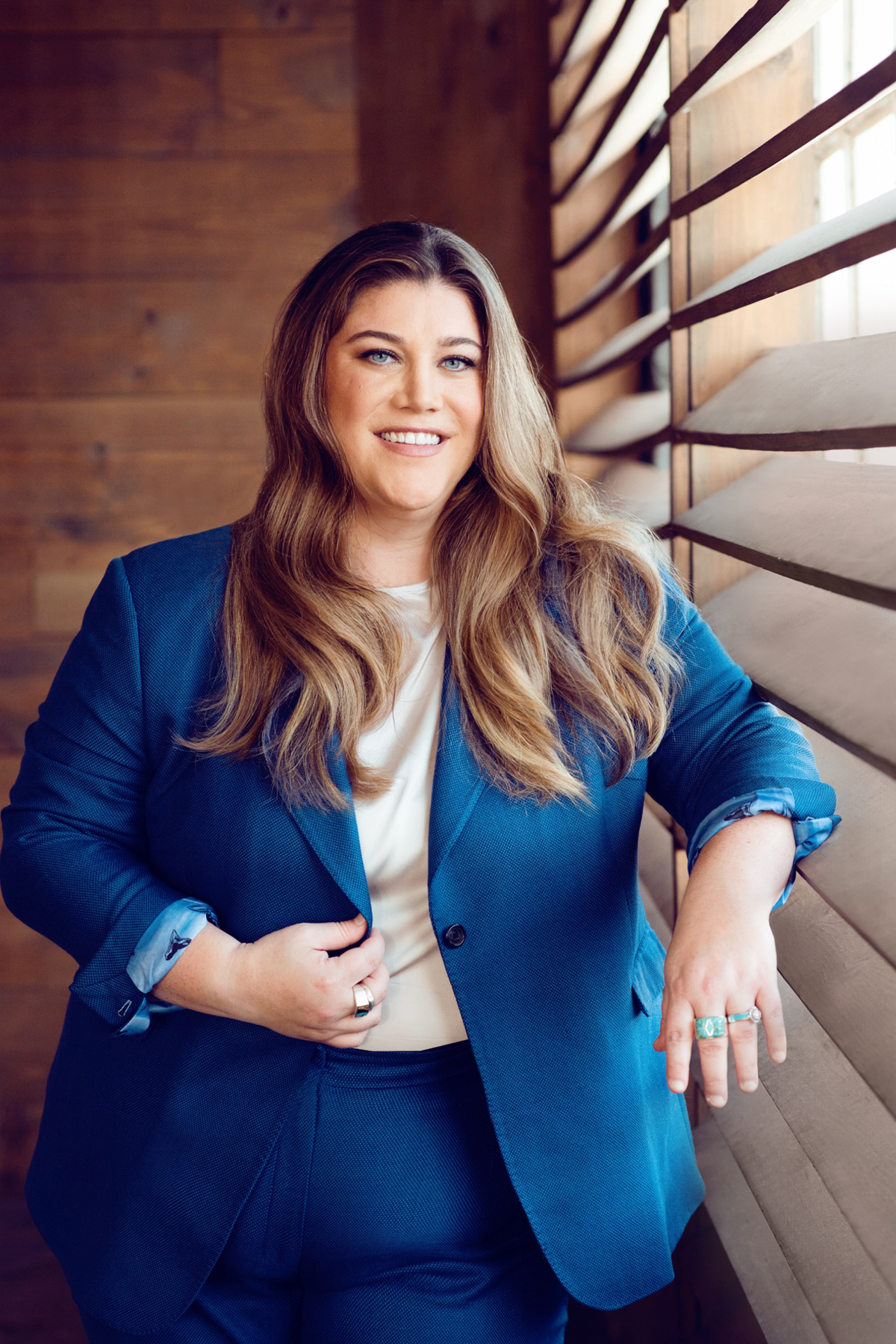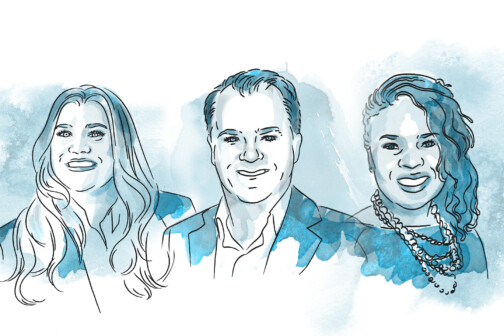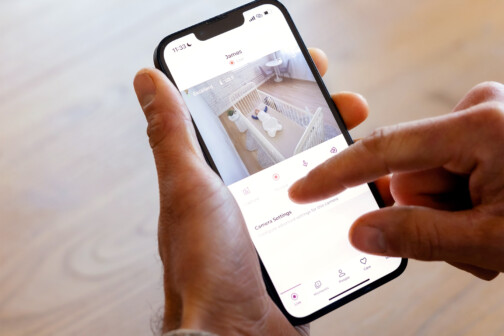At 18, Kelly Ann Winget was living a life many of her peers only dreamed of; she was independent, had money in her pocket, and drove fast cars. “I was making nearly six figures outside of school in sales,” she says. A sales savant, she had maxed out the commission program at the Richardson Car Spa where she worked and had several side hustles, including a gig as a valet, often parking foreign cars for big tips. ¶ Today at 33, Winget manages investments across more than 25 portfolio companies in three private equity funds at Alternative Wealth Partners, a company she founded. She is the only LGBTQ+ female millennial to run a private equity fund focused on alternatives—assets outside of stocks, bonds, or cash, such as real estate, commodities, and private equity. Her company generates an average targeted annual return of 30 percent. ¶ But Winget didn’t take a traditional route to the top. In fact, not much about her is traditional. She’s an entirely self-made entrepreneur despite being born into generational wealth; she never earned a college degree; and she gained her finance smarts working in mostly male-dominated spaces, building transferable skills that translated across industry lines.
Winget got her start behind the register at Car Spa, working weekends to save up for a $300 pair of jeans. “Although I grew up in an affluent family, it was very much known that it was [my parents’] money and we had to find our own,” she says. “It was not expected that we were going to be handed some golden parachute and supported forever.” Her grandparents on both sides were in oil and gas, and the family still holds a collection of assets near Lake Charles, Louisiana.
Like their daughter, Winget’s parents took unconventional approaches to making money. “They were flipping apartment complex houses in the 1980s, and between 2006 and 2008, my mom was working in low-income neighborhoods to renovate apartments in efficient ways,” she says. “She was working in areas people weren’t touching with a 10-foot pole. So, we were encouraged from a young age to do what we wanted.”
At the car wash, Winget was promoted from cashier to sales associate within six months, upselling customers at the register until she outsold the sales adviser and got noticed. She quickly figured out how to maximize opportunities. “They had to change the commission program two or three times while I was there,” Winget laughs. By the time she was 16 and 17, she was raking in $60,000 a year.
She also took her love for cars to a valet company. Winget was among a handful of workers who could drive a stick shift, so the keys to luxury foreign vehicles were often given to her. Between her several jobs, she was soon making nearly six figures.
After high school, Winget was accepted at every four-year college she applied to but opted to take classes at North Central Texas College and Texas Woman’s University. Once she started, she decided to quit school instead. “I was sitting in class thinking, ‘I’ve spent $1,000 for all the books and materials for this class, and all you’re doing is reading [the texts], and I could do that on my own,’” she says.
She went from working outside every day to sitting in a cold, dark room in the basement of a hospital as an executive assistant at Texas Radiology Associates, a collection of 16 radiology clinics across DFW. A couple of years into the job, in 2010, the company laid off its administrative employees. “In less than two weeks, they hired me back,” Winget says. She spent the next year as the only assistant for all locations, working 16 to 18-hour days, reading reports, communicating with hospital staff, and ensuring software was up and running.
When she complained about her hours and lack of benefits, HR told her that the overtime she was making was enough to offset the job’s less appealing elements. “I was working 90 to 100 hours a week,” Winget says. “I like making money, but I couldn’t enjoy it.” Drained, she scrawled her resignation on a sticky note and left.
From there, at the age of 21, she took a job working for a demolition company. “It was really the catalyst to everything that I do now, because I got to experience different departments,” Winget says. She came in as a an hourly “girl Friday,” but quickly noticed several gaps in the business and dove into improving operations.
Winget worked closely with a software consultant to help build a database to support estimation and project management, then led internal implementation. “I watched [the consultant] get paid around $60,000 for a job that I largely did,” Winget says.
When she took the finished software to one of the company’s owners, he asked if she could recast it in Excel so the less tech-savvy could use it. She asked if he would pay her the same $60,000 rate the consultant earned for the previous iteration. The owner declined, but agreed to give her a full-time salary instead of an hourly rate. “So, I built this $100,000 per year licensed software in Excel,” says Winget.
When she finished, she tried to set up meetings to teach employees how to use the Excel system but was met with resistance. That was the final straw. She accepted another job offer and quit, hoping to eventually move to California to work as a business consultant. “I left in November of 2013, and I was living in Newport Beach by April 2014,” Winget says.
During that six-month interim, she worked in the sales department at an oil and gas company operating in the Eagle Ford Shale. Oil prices were more than $100 per barrel. In February 2014, Winget called attention to a pattern she noticed. “I said, ‘The prices are really high, and we are overpaying for mineral rights renewals, which means we are overcharging investors, and eventually, we will lose money,” Winget recounts. “‘We need to pull back on deals, and we need to not pay this much, or take a break, or something.’”
Company leaders were not interested in the forebodings of a 20-something. Winget felt uncomfortable with continuing to overcharge investors, so she and another young partner at the company left after being politely pressured to go. “Oil prices tanked about six months later,” Winget says.
Once in Newport Beach, Winget did independent business consulting while working full-time for a marketing company that was helping startups, and other private companies, raise capital. “We were doing phone campaigns on people’s political opinions about what’s going on in the world, what they were investing in, learning about what the investor behavior was,” Winget says. During her four years in California, she helped companies raise roughly half a billion dollars.
She returned to Dallas in 2018, slowly wound down her buisness, and took a job at Eckard Enterprises, an oil and gas-focused family office. The company had operated for more than 35 years and was facing an aging investor base.“[Founder and CEO Troy Eckard] brought me in to hire new people into the firm and start engaging with new investors and thinking about how you find investors in that day’s space,” Winget says. Together, she and Eckard raised $7.5 million, before her mentor offered her some advice: “He said, ‘You should set up your own fund,’” Winget recalls.
She didn’t quite have the confidence to follow Eckard’s suggestion. “I had only done these small, independent raises, and I wanted to see what the bigger picture was,” Winget says. So, she took a job with a large private equity fund in Nevada, but worked out of Dallas, for three months before realizing her mentor had been right. She left in August 2020 and formed Alternative Wealth Partners.
Winget reached out to contacts she had in the private equity space, explaining her intention to run an alternative investment-focused firm that thrived on transparency and diversification. By June 2021, she launched her first fund and began by investing in a Jamaican coffee operation and an ammunition company, raising $2 million in her first five months. At the end of the year, she added oil and gas assets to the fund and raised another $3 million.
Today, AWP’s investments are across five sectors—manufacturing, energy, infrastructure, real estate, and private equity—and are pooled in three funds (see sidebar). “If you stay diverse in your portfolio, you will have consistent growth—always,” she says. More than 60 percent of Winget’s investors are women or minority investors.
Eventually, Winget hopes to manage $1 billion, but first the firm will focus on developing its newest fund, which is focused on developing economies through real estate in opportunity zones—areas where the Trump legislation incentivized development. “If you invest in that, your gains inside of the opportunity zone funds become tax free after 10 years,” Winget explains.
Because many cities incentivize developments that build their economy, Winget has not had to raise as much. “We are leveraging available public funds with our private equity dollars to maximize our return for investors. When we can get 20-40 percent of our projects funded with free money, it can increase our overall return by 10-20 percent,” Winget says. The fund will launch in September 2023, and Winget hopes to break ground on its first development project, a new build in Chicago, before the end of the year.
The entrepreneur is solidly into the next chapter of her Forrest Gump life. Along with running AWP, she’s newly married to her partner Sarah Matteson (their nuptials were featured in The New York Times), a recently published author of a book on investing, and educating others around strategies and finance.
Matteson’s son recently picked up the drums, which Winget has played since her youth. In her own way, perhaps she can recreate the environment she grew up in. “I wasn’t in an atmosphere that made it weird to do something different,” she says.
Author









